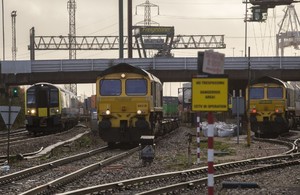First phase of multimodal freight strategy published
Network Rail and Highways England have today published the first phase of the Solent to the Midlands Multimodal Freight Strategy

The strategy is the culmination of a year’s work between the two organisations and represents a further step forward in the collaboration between Highways England and Network Rail in multimodal strategic planning and other areas to better serve our customers.
This study forms part of Network Rail’s Long-Term Planning Process and Highways England’s Route Strategy and Pioneer Projects work, both of which are designed to identify investment priorities for the future. This closer approach to planning and increased involvement of stakeholders is vital to delivering the best results for our customers and funders.
Key findings include:
- Roads are critical to complete the door to door journeys for shorter distances, such as regional and local movements or the last mile from a rail freight interchange. Rail is most cost effective over longer distances and for higher loads.
- Rail and road both have similar reliability in terms of journey times, key for freight consumers where much freight is time dependent.
- Modal shift to rail provides an opportunity to free up road capacity on the Solent to Midlands corridor, especially for those journeys that are greater than 50 miles and greater than 100 miles for bulk and consumer goods respectively.
The Solent to the Midlands route is one of the most important freight corridors in the UK. It links the major port of Southampton with the numerous distribution centres and economic hubs of the Midlands, North and Scotland. The Solent Ports, particularly Southampton, are in favourable locations for connections to the global freight and logistics market due to their proximity to the main shipping lanes. The Midlands is home to a high concentration of large distribution centres and warehouses – the so-called ‘Golden Triangle’ of freight distribution.
The A34, managed by Highways England, links the Solent Ports and the Midlands and is closely mirrored by the equivalent rail route, owned and operated by Network Rail. The parallel nature of the road and rail routes means that it is an ideal candidate for cross-modal analysis.
Paul McMahon, Network Rail’s managing director for the System Operator said:
Both our organisations have a shared goal of keeping Britain moving, as well as contributing to achieving the government’s target of net-zero carbon emissions by 2050. This study contributes to these goals by demonstrating how both networks could be used more efficiently in terms of their overall capacity and their carbon footprint.
Elliot Shaw, Highways England executive director of strategy and planning, said:
Highways England and Network Rail operate two of the country’s most important transport infrastructure networks for the freight and logistics industries. The Solent to Midlands Joint Strategic Study is a good example of us working together to identify the optimum solutions that could benefit road and rail users, the economy and the environment.
Taking a holistic approach, this study uses data in exciting and innovative ways to identify where there may be freight flows that currently use road but could be better served by rail. It also outlines the significant benefits that modal shift to rail offers both to freight end-users but also to the wider road and rail networks.
Phase 1 of this freight strategy outlines the potential for change and the scale of the benefits that could be achieved.
Next steps include:
- Continued collaboration between Network Rail and Highways England to develop the strategy for this important corridor and to look at other areas that would benefit from joint working to provide an improved service for customers.
- Removal of the barriers to rail freight growth needed to enable the increased freight flows out of the Solent.
- Unlocking new markets for rail freight.
- Decarbonisation of freight movements and the road freight system.
General enquiries
Members of the public should contact the Highways England customer contact centre on 0300 123 5000.
Media enquiries
Journalists should contact the Highways England press office on 0844 693 1448 and use the menu to speak to the most appropriate press officer.